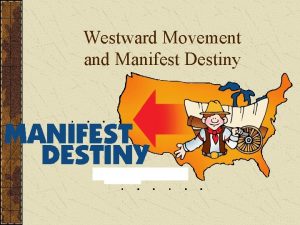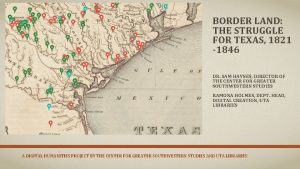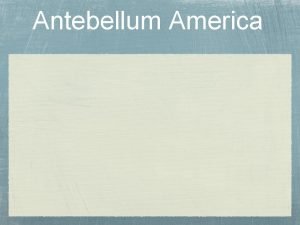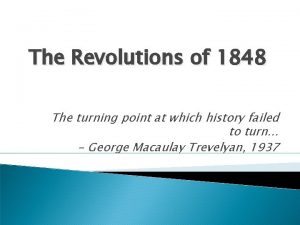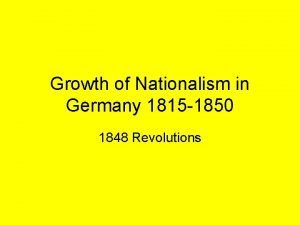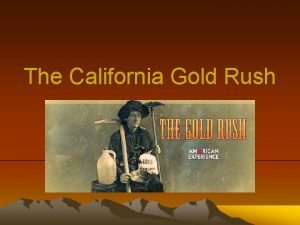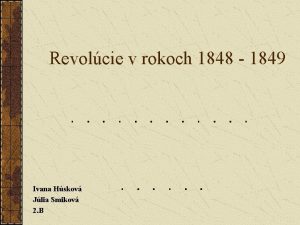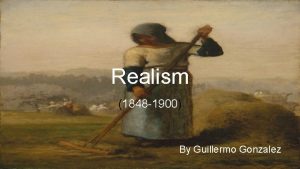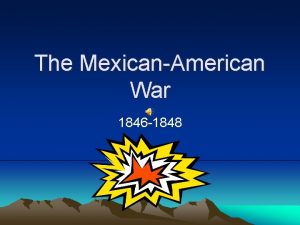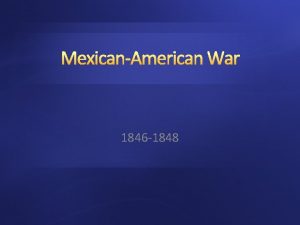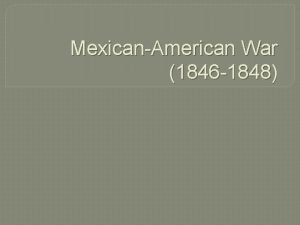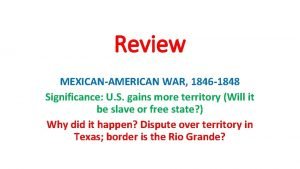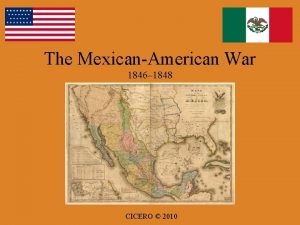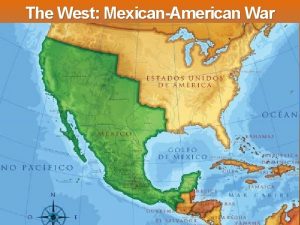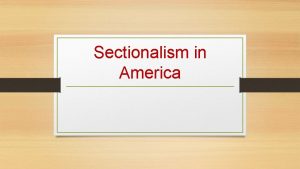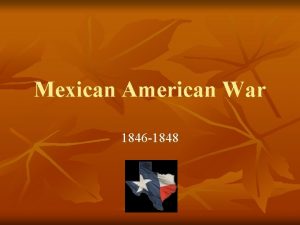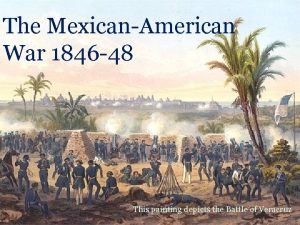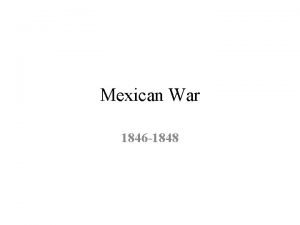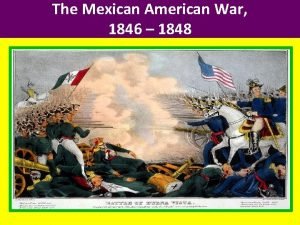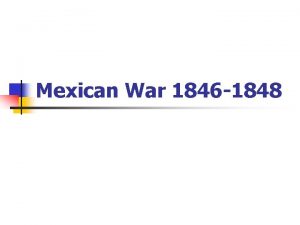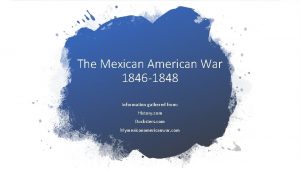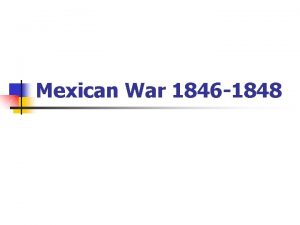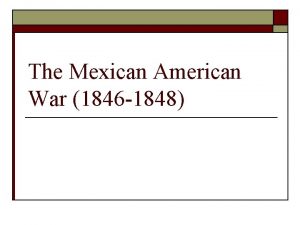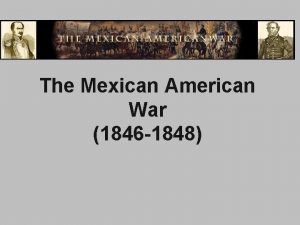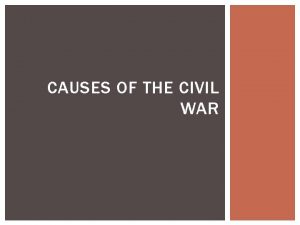Ch 10 Sectionalism MexicanAmerican War 1846 1848 Texas




















- Slides: 20

Ch. 10 - Sectionalism

Mexican-American War 1846 -1848 Texas became a U. S. state in 1845 Mexico continued to arm the border and contest Texas’s Independence President Polk set his sights on the entire southwest region of modern U. S. --at the time owned by Mexico

Before the Mexican American War.

After the Mexican. American War.

Important Land Agreements Treaty of Guadalupe. Hidalgo. Ended the Mexican-American War in favor of the United States. (1848) Gadsden Purchase. Added land to what is today New Mexico and Arizona. (1853)

Wilmot Proviso - Proposed by Pennsylvanian Democrat David Wilmot in 1846 as an amendment to a military appropriations bill Stated that no slavery would be allowed in territory acquired from Mexico ■ North supported - Were afraid slavery would mean no jobs for free workers - Northerners wanted all of the land obtained from Mexico to be free states ■ South opposed - Argued that slaves were property under Constitution & feared more free states -South worried it would lose control of the government - Needed the free and slave states to be equal

Mexican War Impact ■ Free Soil Party – - new political party formed that demanded the end of slavery - Wanted Congress to give western settlers free homesteads - Opposed extension of slavery into territories - Many Free-Soilers weren’t abolitionists; supported restrictions on blacks - Objected to slavery’s impact on white wage-based labor force - Convinced of conspiracy to spread slavery throughout U. S. By 1850 – As a result of the Gold Rush, California skipped the Territorial Phase of becoming a state ■ California asked to enter the Union as a free state - South wanted it divided into two states (Why? ) ■ The Senate begins to debate the admission of these states as free states – south begins to discuss secession! ■

Compromise of 1850 California entered the Union as free state ■ Rest of the Mexican Cession was divided into the territories of Utah and New Mexico Popular Sovereignty Policy – people in territories would decide for themselves ■ Slave trade was abolished in Washington D. C. but slavery permitted. ■

Compromise of 1850 ■ Fugitive Slave Law - passed – people in free states had to help catch and return runaway slave - Alleged fugitives denied jury trial, right to testify on own behalf - Federal commissioners paid more for returning than freeing accused - People convicted of helping a fugitive were fined, imprisoned, or both ■ Neither the north or south liked the compromise

Underground Railroad Northerners sent fugitives to Canada, some use forced in rescues Personal liberty laws in 9 northern states forbid prison for fugitives & granted them jury trials ■ Underground Railroad—secret network of people who help slaves escape - Harriet Tubman escapes from slavery, becomes conductor on 19 trips - Fugitives go on foot at night, often no food, avoiding armed patrols - Some fugitives stayed in North; others went on to Canada ■ ■

Uncle Tom’s Cabin Harriet Beecher Stowe wrote a book telling about the cruel treatment of a slave ■ Caused many Americans to begin supporting the abolitionist movement ■ Stowe pointed out that slavery was not just the South's problem, but the nation’s problem ■ Uncle Tom’s Cabin showed slavery as moral problem, not just political ■

Kansas- Nebraska Act ■ ■ ■ Senator Stephen Douglas (Illinois) - wanted to build a transcontinental railroad from Chicago to California - It would have to cross the unorganized territory of the Great Plains Act called for the creation of two new territories (KS & NB) - Both were north of the Missouri Compromise line Douglas’s bill repealed Missouri Compromise; bitter debate ensues Act passed with support of the south 1854 - Kansas-Nebraska Act – popular sovereignty Whig Party splintered after Kansas-Nebraska Act of 1854

Bleeding Kansas ■ ■ ■ ■ Kansas became battleground over slavery Northern, Southern settlers pour into Kansas Territory Most settlers sent by antislavery emigrant aid societies More antislavery settlers (free soilers) than proslavery 1855 - Kansas holds election for territorial legislature Proslavery Missourians crossed the border (Border Ruffians) and stuffed ballot boxes on election day Each side boycotted the election Set up 2 governments - Proslavery Govt in Lecompton - Antislavery Govt in Topeka

Bleeding Kansas May 1856 – proslavery group attacked Lawrence burned stores and home (several died) ■ John Brown led antislavery group that killed 5 proslavery settlers “The Pottawatomie Massacre” ■ Territory called Bleeding Kansas for incidents that kill some 200 ■ http: //www. history. com/topics/johnbrown/videos/sound-smart-bleeding-kansas

Dred Scott Decision ■ ■ ■ 1857 – Dred Scott sued for freedom Had lived in north with his master before returning to the south Said that made him a free man after his master’s death Supreme Court ruled that Scott was still a slave - Congress cannot forbid slavery in territories - Also said that Congress couldn’t ban slavery - Only states could Big victory for proslavery people

Lincoln-Douglas Debates • 1858, Republican Abraham Lincoln ran for Stephen Douglas’s Senate seat • Because Lincoln’s unknown, challenges Douglas to debates ■ Douglas believed slavery was backward & unsuitable for prairie agriculture - He didn’t think it was immoral - Wanted popular sovereignty to decide issue (thought it would undo slavery) ■ Lincoln believed slavery was immoral - Lincoln though legislation needed to stop spread of slavery

Election of 1860 • Two different elections - South election was between Breckinridge and Bell - North was between Douglass and Lincoln Abraham Lincoln won the election with only 40 % of the popular vote (carried the more populous northern states - Wasn’t even on part of the southern ballots • Lincoln had never called for ending slavery he just didn’t want it to spread - Lincoln told south he wouldn’t meddle with slaves

Election of 1860 ■ South became angry that president could be elected without any southern electoral votes they feared they had lost control; of the government - 18 free states and 15 slave states - Felt threatened that slavery would be abolished

Southern States Secede ■ Dec. 20 1860 – South Carolina seceded from the union – Said it voluntarily joined the union it could voluntarily leave – Other southern states leave the union in next 6 weeks – Mississippi, Florida, Alabama, Georgia, Louisiana, and Texas

The Calm Before the Storm ■ ■ ■ President Buchanan called secession illegal - Also said it was illegal to stop it Mass resignations from government in Washington, D. C. (Southern city) Some people thought the federal government was melting away Abraham Lincoln didn’t take office until March 1961 Would North allow the South to leave the union without a fight?
 Din 1846
Din 1846 The oregon treaty of 1846
The oregon treaty of 1846 1846
1846 Remembrance poem 1846
Remembrance poem 1846 Eli whitney
Eli whitney Din 1846
Din 1846 Austroslavism
Austroslavism Il 1848 in europa e in italia
Il 1848 in europa e in italia Leto 1848 leto revolucij
Leto 1848 leto revolucij Why did the 1848 revolutions fail
Why did the 1848 revolutions fail Humiliation of olmutz
Humiliation of olmutz Julska monarhija
Julska monarhija Francuska revolucija 1848
Francuska revolucija 1848 January 24th 1848
January 24th 1848 Leto 1848 in slovenci
Leto 1848 in slovenci Kleindeutsche lösung
Kleindeutsche lösung 1848 revolution germany
1848 revolution germany Bolzano (1781 – 1848)
Bolzano (1781 – 1848) Francúzska revolúcia 1848
Francúzska revolúcia 1848 Realism (1848–1900)
Realism (1848–1900) Leto 1848 in slovenci
Leto 1848 in slovenci

